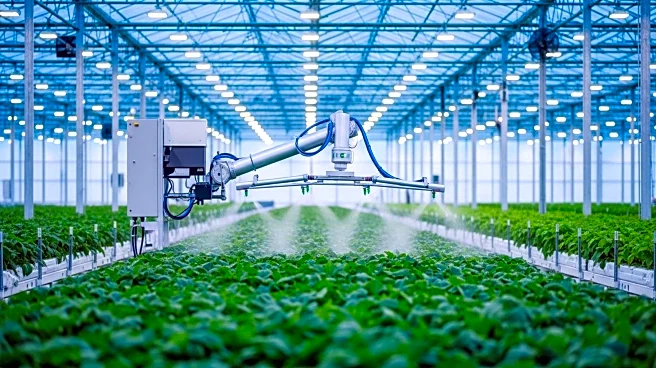What's Happening?
The Agro Chem Federation of India (ACFI) has called for the implementation of a Production-linked Incentive (PLI) scheme and tax holidays to reduce dependency on imports for technical ingredients and establish agrochemical manufacturing hubs. This initiative aims to boost domestic production and enhance agricultural productivity. ACFI, along with Deloitte, released a knowledge paper during their Annual General Meeting, highlighting the importance of the crop protection chemicals industry and suggesting measures to strengthen the sector. The report emphasized India's significant role in agrochemical exports, valued at USD 3.3 billion in 2024-25, making it the third-largest exporter globally. However, the industry remains vulnerable due to reliance on imports from China, posing strategic risks amid geopolitical tensions.
Why It's Important?
The proposed PLI scheme is crucial for fostering self-reliance in the agrochemical sector, reducing strategic risks associated with import dependency, and strengthening India's position in the global supply chain. By boosting local production, the initiative could enhance agricultural productivity and contribute to the global food supply chain. The move is expected to benefit farmers by ensuring the availability of quality agrochemical products, potentially increasing agricultural output and income. Additionally, promoting Public-Private R&D collaboration and supporting MSMEs in the sector could drive innovation and growth, further solidifying India's agrochemical industry.
What's Next?
The government is expected to consider the introduction of the PLI scheme targeting critical active ingredients and key intermediates currently imported in large volumes. This could lead to increased local production and self-reliance. Stakeholders, including industry leaders and policymakers, may engage in discussions to address the strategic risks and explore opportunities for collaboration and investment in the sector. The focus will likely be on enhancing ease of doing business to achieve the goal of doubling farmers' income and improving agricultural productivity.
Beyond the Headlines
The initiative to boost domestic agrochemical production could have broader implications for environmental sustainability and climate resilience in agriculture. By reducing dependency on imports, India could mitigate the impact of global supply chain disruptions and enhance food security. The emphasis on Public-Private R&D collaboration may lead to advancements in sustainable agricultural practices and technologies, contributing to long-term environmental and economic benefits.











